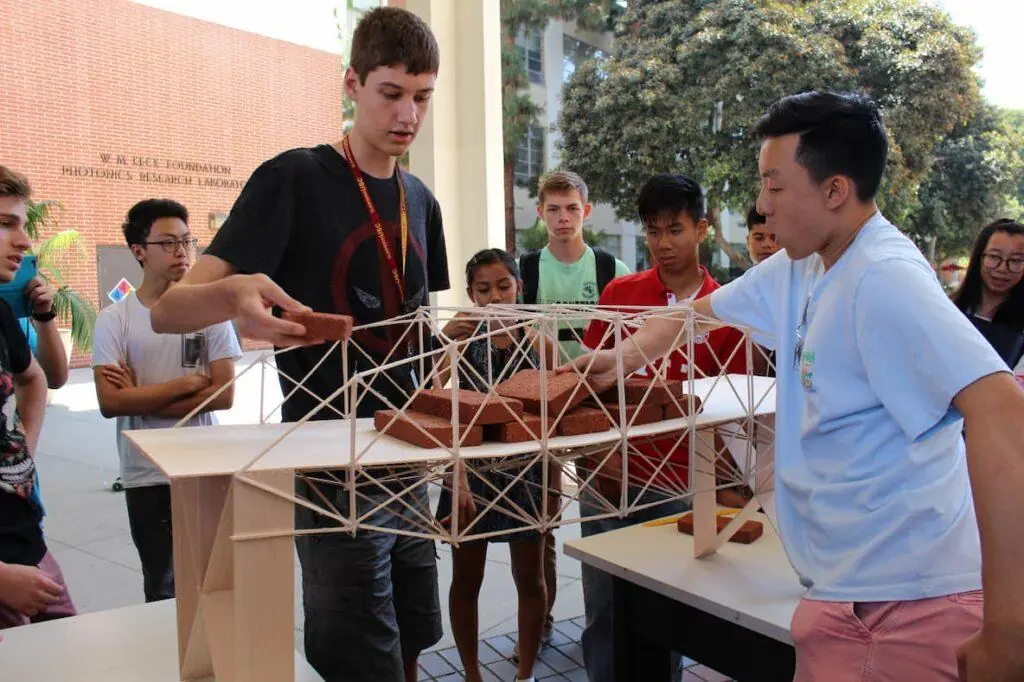Attending college is a significant life change — it’s undoubtedly exciting, but it can also be quite intimidating. Fortunately, there is a way to get a firsthand experience of college life before fully committing to a university: a pre-college program.
Pre-college programs, typically held during the summer, offer students an invaluable glimpse into what it is really like to be an undergraduate student. These programs allow students to explore the campus, attend college-level classes and participate in lectures, providing a real taste of college life.
By making college feel less daunting and more familiar, pre-college programs help students make crucial decisions about their next steps, including which type of school to attend and what major to pursue.
Here’s everything you need to know about pre-college programs:
What is a Pre-College Program?
Universities offer pre-college programs to introduce prospective students to academic and campus life. Participants get to experience the educational aspect of college by attending real classes, lectures, seminars and workshops. They also enjoy the social side of college, meeting new people, participating in mixers and events, and exploring the campus.
These programs typically occur during the summer, although some universities also offer them over winter, fall or spring breaks. Lasting from about a week to six weeks, pre-college courses allow students to fully immerse themselves in college life. While some programs are online, most offer the option to stay in on-campus dorms, and commuting options are usually available as well.
How Old Do You Have to Be to Enroll in a Pre-College Program?
Pre-college programs are almost always designed for high school students and are open to rising freshmen, sophomores, juniors and seniors. While the most traditional time to participate is the summer before senior year — right before students start crafting their applications and choosing which universities to apply to — it can benefit students to enroll even earlier. Engaging with pre-college programs as rising freshmen and sophomores can significantly shape students’ academic interests and future college plans.
When Should You Start Applying to a Pre-College Summer Program?
As many pre-college courses run during the summer months, high schoolers should begin researching their program options in the late fall and early winter. Applications typically close by the spring, so students should get a head start on the process to ensure they meet all deadlines.
Starting early allows time for gathering the necessary materials, such as letters of recommendation, transcripts and personal statements. It also provides an opportunity to explore multiple programs and identify those that align best with their academic and personal goals.
What Are the Benefits of Joining a Pre-College Program?
There are several advantages to attending a pre-college program, including:
Exposure to College Life. College is a major transition for students. They’re starting at an entirely new place, likely much bigger than their high school, where they might not know many people. For most students, it’s the first time living on their own and handling major decisions independently. So, it’s natural to feel a culture shock.
A pre-college program allows students to experience living in a dorm, following a college schedule, navigating campus and meeting new peers in a university setting. When they experience their real first day of college, they’ll feel better prepared and have a realistic idea of what to expect during this important life change.
Better Preparation for College Academics: By attending university classes and lectures, high schoolers can get a sense of college curriculum and how they’ll need to prepare for success. It can also help them determine which types of classes interest them, as well as what academic areas they will want to explore during their undergraduate studies.
Help Selecting a College or Major: Similarly, when students experience life at a university or in a specific class, it can give them clarity on where — and what — they want to study in college. Students may complete their pre-college program with a strong desire to attend that university, or they may come away with a clearer understanding of the attributes they seek in a school. The classes they enjoy (and those they don’t) can also help guide them toward selecting the appropriate major.
College Credit: Some programs offer college credit, reducing the number of classes students need to complete once they arrive at university. If the program does not offer credit, however, students can always list the experience on their resume and highlight it throughout their college applications.
Boost College Applications: Participating in a pre-college program can make applicants more attractive to universities, especially if they’ve previously attended a program at that institution. Even if it’s a different school, it still demonstrates a student’s commitment to excelling in college.
Building Connections: One of the most intimidating aspects of attending college is making new friends. Most students arrive with few connections and have to rebuild their social circle. Pre-college programs help high schoolers meet peers who might end up attending the same university, or they may simply expand the student’s network, which is crucial for the post-college job hunt.
Building Confidence and Other Personal Skills: Participating in a pre-college program allows students to develop new skills, both personally and academically. Many will feel a sense of pride and renewed confidence after demonstrating their abilities in a different environment. It’s an excellent way to foster student growth.
How Much Does a Pre-College Program Cost?
Costs for a pre-college program will vary, depending on factors such as the program length, the content of the program, whether it involves a residential component, the institution itself and more. Certain universities, including USC, also have online pre-college courses, which may offer greater affordability and accessibility comparted to residential experiences.
How Do You Apply to a Pre-College Program?
Some pre-college programs are open for all high school students, while others select certain applicants (usually based off standard application requisites like letters of recommendation, GPA, standardized test scores, personal essays and more). Make sure to check each program’s website for application instructions and requirements.
How Do You Pick the Right Pre-College Program?
Selecting a pre-college program is a deeply personal decision. It’s important for high schoolers to think carefully about where they’d like to spend their time to gain that valuable experience. However, it’s also beneficial for students to explore different options to gain clarity on their college preferences and even discover unexpected opportunities.
Several factors, including location, program content, cost and timing, should be taken into account. Students may want to consider trying out a new state or city, exploring programs tailored to specific majors or examining various course options.
Ultimately, it’s essential for students to identify their goals for participating in a pre-college program and conduct thorough research to find the best fit before applying.
Pre-College Programs at USC
USC offers both a residential program and online exploration courses. USC Summer Programs is a for-credit pre-college program held during the summer on the USC campus. It prepares students for college life with a series of workshops, lectures, labs and visits by guest speakers.
Students can select from a variety of courses, including, architecture, business, engineering and information technology, global studies, communication and journalism, performing arts and music, pre-health and science, pre-law, and writing and critical thinking.
USC Pre-College online exploration courses are offered year-round and allow high school students to explore their academic interests with maximum flexibility. Upon course completion, students earn a Certificate of Completion, which can be added to their college resumes. There are courses in areas such as business, cybersecurity, film, life sciences, media, political science and more.
Regardless of your dream, you can find the right pre-college program at USC! Explore all course offerings today.

